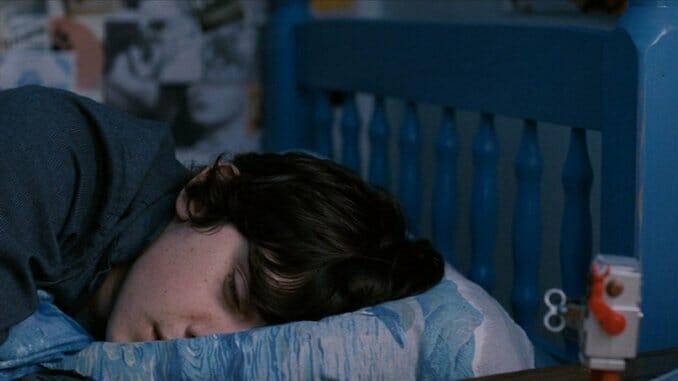Submarine at 10: A Legacy of White Male Insecurity Leveraged as Comedic Device

The allure of indie coming-of-age movies is partially anchored in the room these films create for characters to be unabashedly offbeat, uncertain, particular. While there are memeable personality cults around pastel-clad, cigarette-smoking Andersonian characters and mumblecore films about well-off white twenty-somethings sorting themselves out in apartments they cannot afford, films that intentionally, unironically capture people on the brink of adulthood legitimize the discomfort of growing up. When young characters are no longer an amalgam of eccentric ideas and familiar—albeit embarrassing—rites of passage, they start to feel more like people.
Juno, for example, with Elliot Page’s quippy, Mott the Hoople-obsessed sing-song delivery, still resonates. Juno (Page) and Paulie (Michael Cera) don’t aim to stand out, but they are palpably distinct because they, unlike most characters their age, are unmotivated by the pull of post-pubescent popularity. They aren’t aiming to be different just like everyone else. Molly Ringwald’s revolving door of Hughesian girls find themselves either questioning the admiration they receive from their peers (Claire in The Breakfast Club) or yearning for it (Andie in Pretty in Pink, Samantha in Sixteen Candles). Understanding the merit of personal authenticity after first pandering for public approval, especially when done by white dudes, is the fulcrum of Apatowian teen sex comedies like Superbad. But of all of the intriguing indie bildungsromans of the last fifteen years about the perils of popularity and misunderstood white boys, few have impacted me as much as Richard Ayoade’s coming-of age comedy Submarine, which had its U.S premiere at Sundance 10 years ago.
The ultimate legacy of Submarine will likely be its more self-aware approach to its particular brand of coming-of-age, alongside its distinct visual style and sound. Arctic Monkeys frontman Alex Turner composed original songs for the crimson and deep blue-tinged film. The combination of Turner’s meditative lyricism and Ayoade’s sublime direction (in his feature debut) has resulted in one of my favorite montages in film history.
Additionally, while Oliver’s follies are the crux of the film’s comedy, he—unlike other boys his age in these sorts of films—is not ultimately given a pass for his mistakes. As we reflect on what made Submarine and films like it affecting, it’s useful to confront the ways in which the shortcomings of young white men are typically painted as amusing and incapable of causing lasting harm, havoc or even danger.
Submarine follows Oliver Tate (Craig Roberts), a 15-year-old Welsh boy preoccupied with his “street cred;” the stale marriage of his parents, Jill (Sally Hawkins) and Lloyd (Noah Taylor); and his attraction to Jordana Bevan (Yasmin Paige), a semi-popular girl with bangs (because of course she has bangs) who performs indifference as a way of coping with her mother’s cancer diagnosis. One of the film’s most successful comedic tools, aside from its intermittent spitfire banter, is the depth of Oliver’s insecurity.
The style of Submarine doesn’t necessarily ask the audience to perceive Oliver as pathetic, or even laughable. Rather, the consequences of his becoming—the buffering of his personhood—create narrative tension which grounds the comedic elements of the film. For example, when sitting in a classroom alongside his peers, Oliver fantasizes about how deeply his classmates, Jordana and all of Wales might mourn were he to die—and like Christ himself, miraculously be resurrected. This scene is one of the film’s many playful, glimmering dream sequences.
-

-

-

-

-

-

-

-

-

-

-

-

-

-

-

-

-

-

-

-

-

-

-

-

-

-

-

-

-

-

-

-

-

-

-

-

-

-

-

-








































